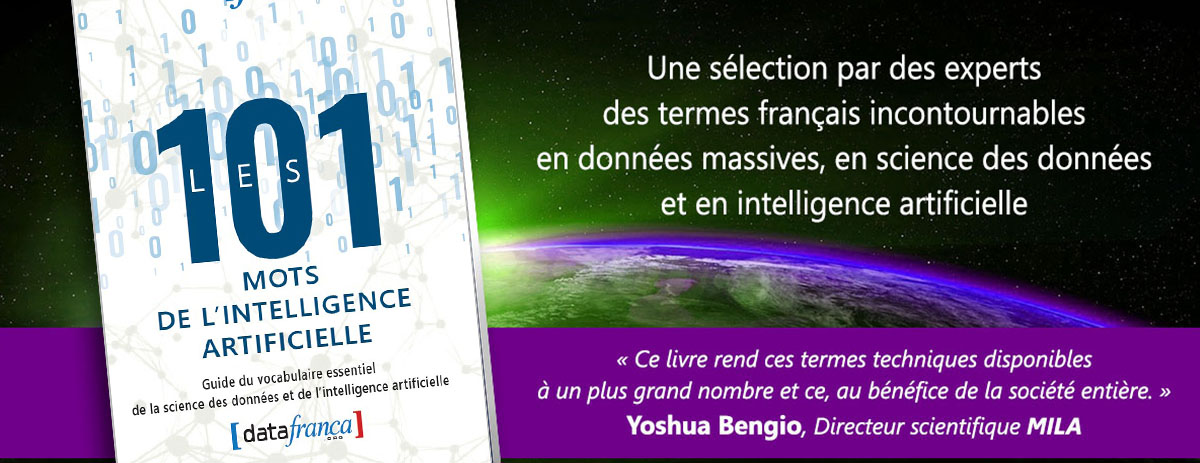« AI-complete » : différence entre les versions
mAucun résumé des modifications |
Aucun résumé des modifications |
||
| Ligne 4 : | Ligne 4 : | ||
[[Category:Artificial Intelligence]]Artificial Intelligence<br /> | [[Category:Artificial Intelligence]]Artificial Intelligence<br /> | ||
[[Category:Intelligence artificielle]]Intelligence artificielle<br /> | [[Category:Intelligence artificielle]]Intelligence artificielle<br /> | ||
<br /> | |||
== Définition == | == Définition == | ||
On parle de tâches IA-complètes (en anglais «AI-complete») ou IA-dures («AI-Hard») par analogie avec les problèmes NP-complets que l'on retrouve dans la théorie de la complexité du calcul. Les problèmes NP-complets sont des problèmes qu'on ne sait pas résoudre efficacement en un temps d'exécution polynomial mais plutôt en un temps d'exécution exponentiel. <br /> | |||
<br /> | |||
== Termes privilégiés == | == Termes privilégiés == | ||
| Ligne 16 : | Ligne 18 : | ||
intelligence artificielle générale | intelligence artificielle générale | ||
</poll></h4> | </poll></h4> | ||
< | <br /> | ||
<br /> | |||
== Anglais == | == Anglais == | ||
=== AI-complete === | === AI-complete === | ||
In the field of artificial intelligence, the most difficult problems are informally known as AI-complete or AI-hard, implying that the difficulty of these computational problems is equivalent to that of solving the central artificial intelligence problem—making computers as intelligent as people, or strong AI.[1] To call a problem AI-complete reflects an attitude that it would not be solved by a simple specific algorithm. | In the field of artificial intelligence, the most difficult problems are informally known as AI-complete or AI-hard, implying that the difficulty of these computational problems is equivalent to that of solving the central artificial intelligence problem—making computers as intelligent as people, or strong AI.[1] To call a problem AI-complete reflects an attitude that it would not be solved by a simple specific algorithm.<br /> | ||
AI-complete problems are hypothesised to include computer vision, natural language understanding, and dealing with unexpected circumstances while solving any real world problem.[2] | AI-complete problems are hypothesised to include computer vision, natural language understanding, and dealing with unexpected circumstances while solving any real world problem.[2] | ||
<br/> | <br/> | ||
<br/> | <br/> | ||
Version du 14 mai 2018 à 20:40
Domaine
Vocabulary
Artificial Intelligence
Intelligence artificielle
Définition
On parle de tâches IA-complètes (en anglais «AI-complete») ou IA-dures («AI-Hard») par analogie avec les problèmes NP-complets que l'on retrouve dans la théorie de la complexité du calcul. Les problèmes NP-complets sont des problèmes qu'on ne sait pas résoudre efficacement en un temps d'exécution polynomial mais plutôt en un temps d'exécution exponentiel.
Termes privilégiés
<poll> Choisissez parmi ces termes proposés : IA-complète IA-dure IA générale intelligence artificielle générale </poll>
Anglais
AI-complete
In the field of artificial intelligence, the most difficult problems are informally known as AI-complete or AI-hard, implying that the difficulty of these computational problems is equivalent to that of solving the central artificial intelligence problem—making computers as intelligent as people, or strong AI.[1] To call a problem AI-complete reflects an attitude that it would not be solved by a simple specific algorithm.
AI-complete problems are hypothesised to include computer vision, natural language understanding, and dealing with unexpected circumstances while solving any real world problem.[2]
Contributeurs: Claude Coulombe, wiki










